A powerful 8.8-magnitude undersea earthquake off Russia’s eastern coast triggered tsunami alerts across the Pacific Wednesday morning.
The firstb tsunami waves hit Hawaii, the Kuril Islands and Japan’s northern island of Hokkaido.
In Russia’s Far East, particularly the Kamchatka Peninsula near the quake’s epicenter, authorities reported evacuations and localized damage.
Tsunami warnings remain active for Alaska, Hawaii, and coastal regions stretching as far south as New Zealand.
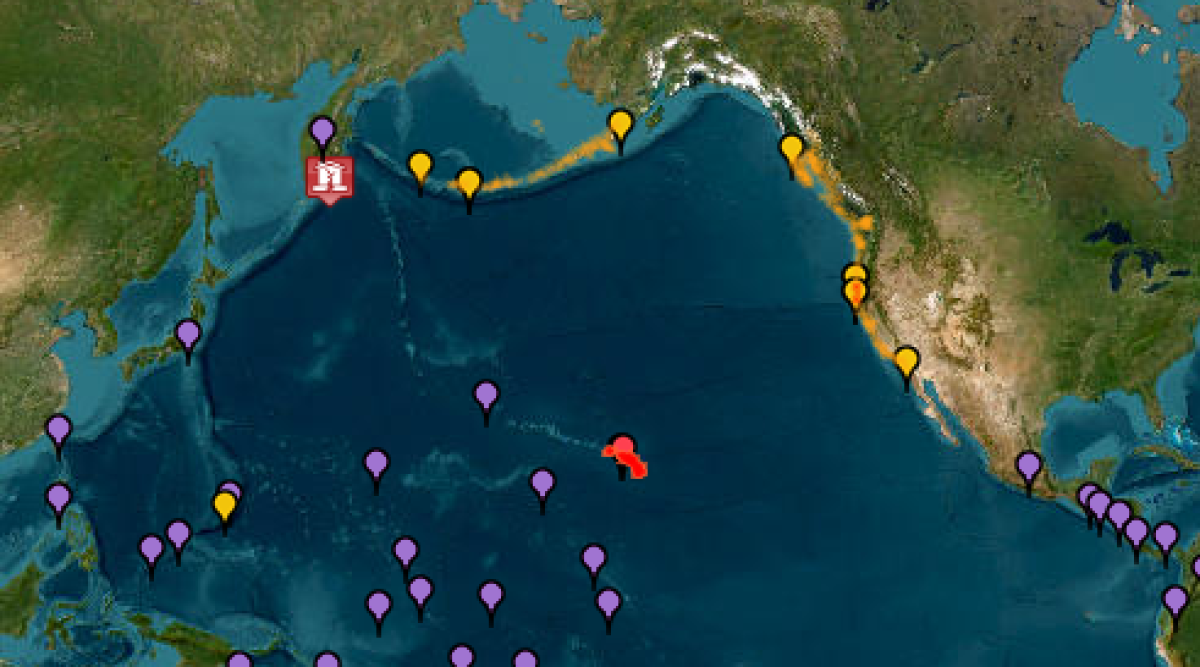
Tsunami alerts across the region
Tsunami alerts across the region
NOAA
03:30 AM EDT
What Is a Tsunami and What Happens When It Hits Shore?
The word tsunami comes from the Japanese words for harbor and wave. It is a fast-traveling wave usually triggered by vertical movements of the sea floor as a result of an off-shore earthquake.
Tsunami waves can travel at up to 600 miles per hour, fanning out across oceans from the epicenter of the quake.
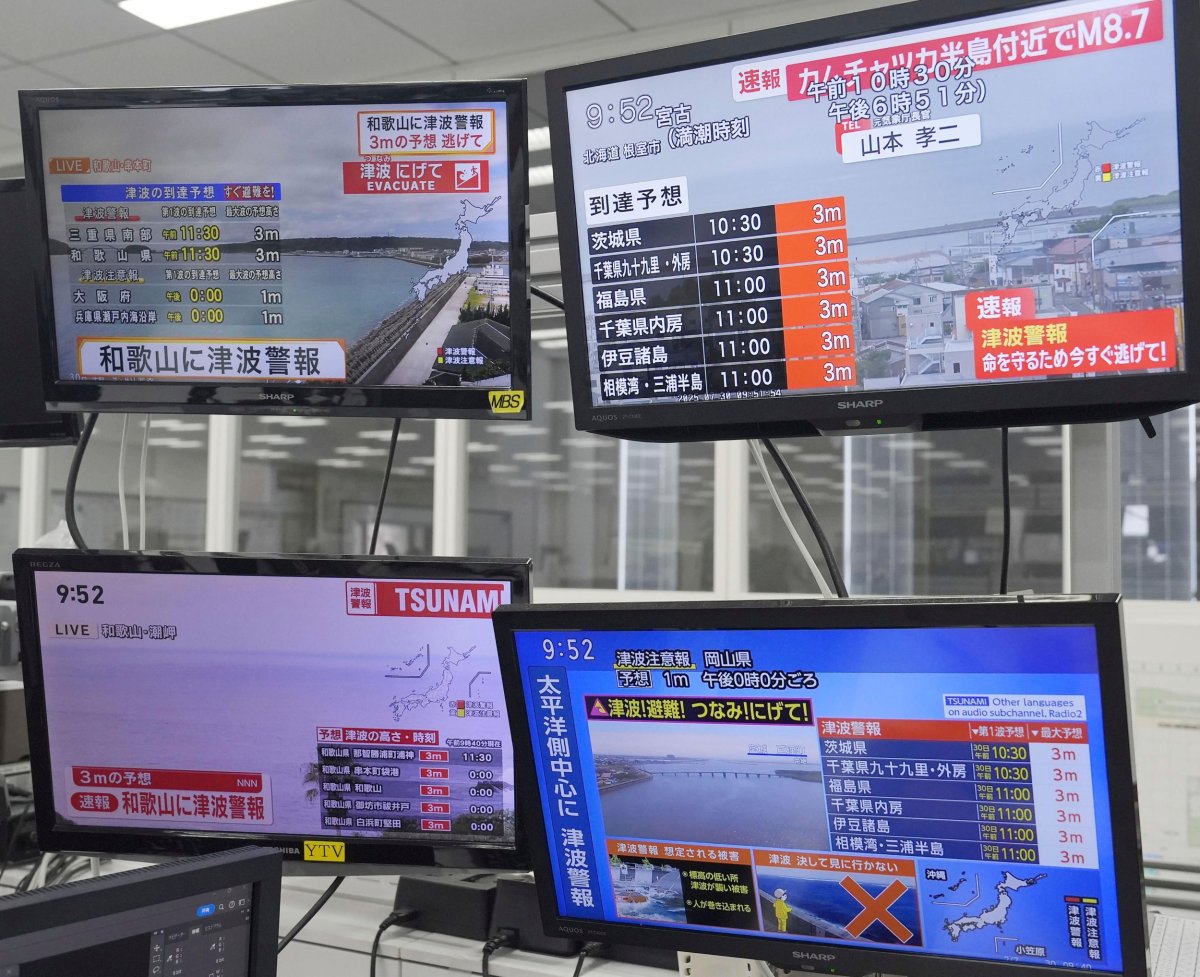
TV monitors show news flash after a powerful earthquake in Russia’s Far East prompted tsunami warnings in parts of Japan, in Osaka, western Japan Wednesday, July 30, 2025.
TV monitors show news flash after a powerful earthquake in Russia’s Far East prompted tsunami warnings in parts of Japan, in Osaka, western Japan Wednesday, July 30, 2025.
Kai Naito/Kyodo News via AP
Tsunami waves involve movement of the entire water column from surface to sea floor. So while the height of normal waves and tsunami waves is similar in deep ocean water, near shore, tsunami waves slow and swell, reaching heights of 30 feet or more as they crash onto the coast.
About 59 percent of the world’s tsunamis have occurred in the Pacific Ocean, 25 percent in the Mediterranean Sea, 12 percent in the Atlantic Ocean and 4 percent in the Indian Ocean, according to historical records.
An earthquake of more than 9 magnitude off Indonesia’s Sumatra island in 2004 brought death and destruction to countries all around the Indian Ocean, including Indonesia, Thailand, Myanmar, India, Sri Lanka and Africa’s Kenya and Tanzania, killing some 230,000 people in all.
03:25 AM EDT
Whales Washed Ashore in Japan
Several whales have been washed ashore in Japan by the tsunami waves.
Japanese television broadcast footage of the whales:
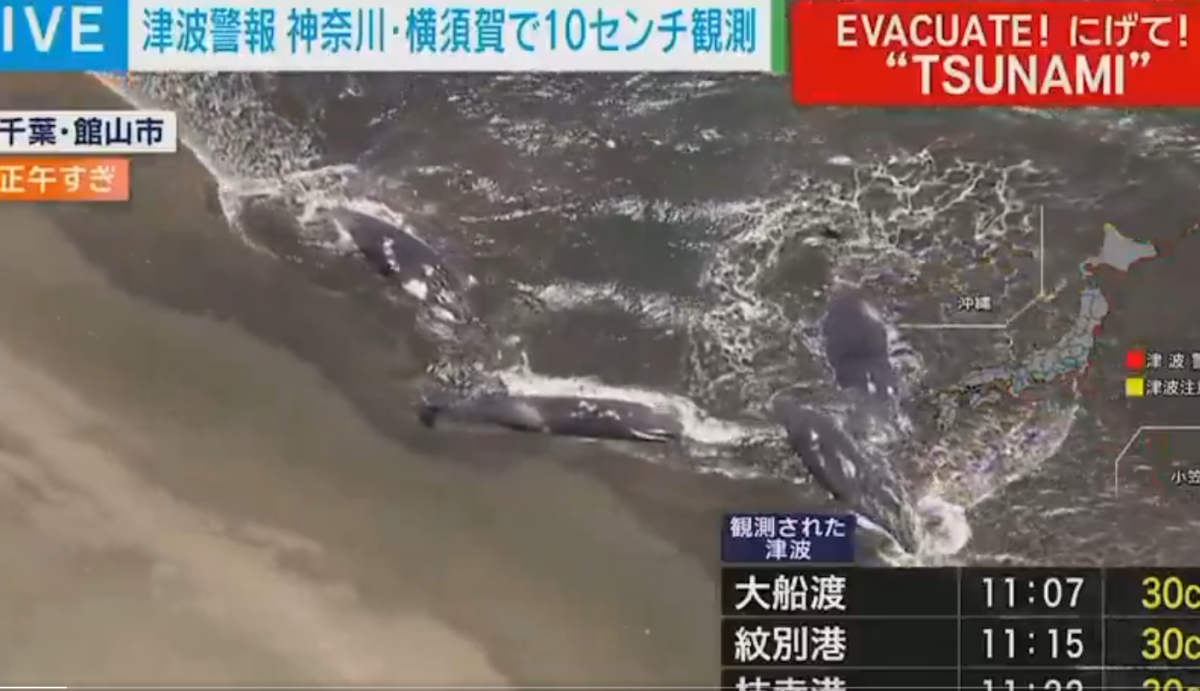
03:17 AM EDT
Huge Quake Rocks Russia’s Far East
The massive undersea earthquake jolted Russia’s Far East early Wednesday, sending shockwaves through the Kamchatka Peninsula and prompting urgent evacuations along the Pacific Rim.
Initially measured at magnitude 8.0 by seismologists in Japan and the U.S., the quake was later upgraded by the U.S. Geological Survey to a powerful 8.8, striking at a shallow depth of 20.7 kilometers (13 miles).
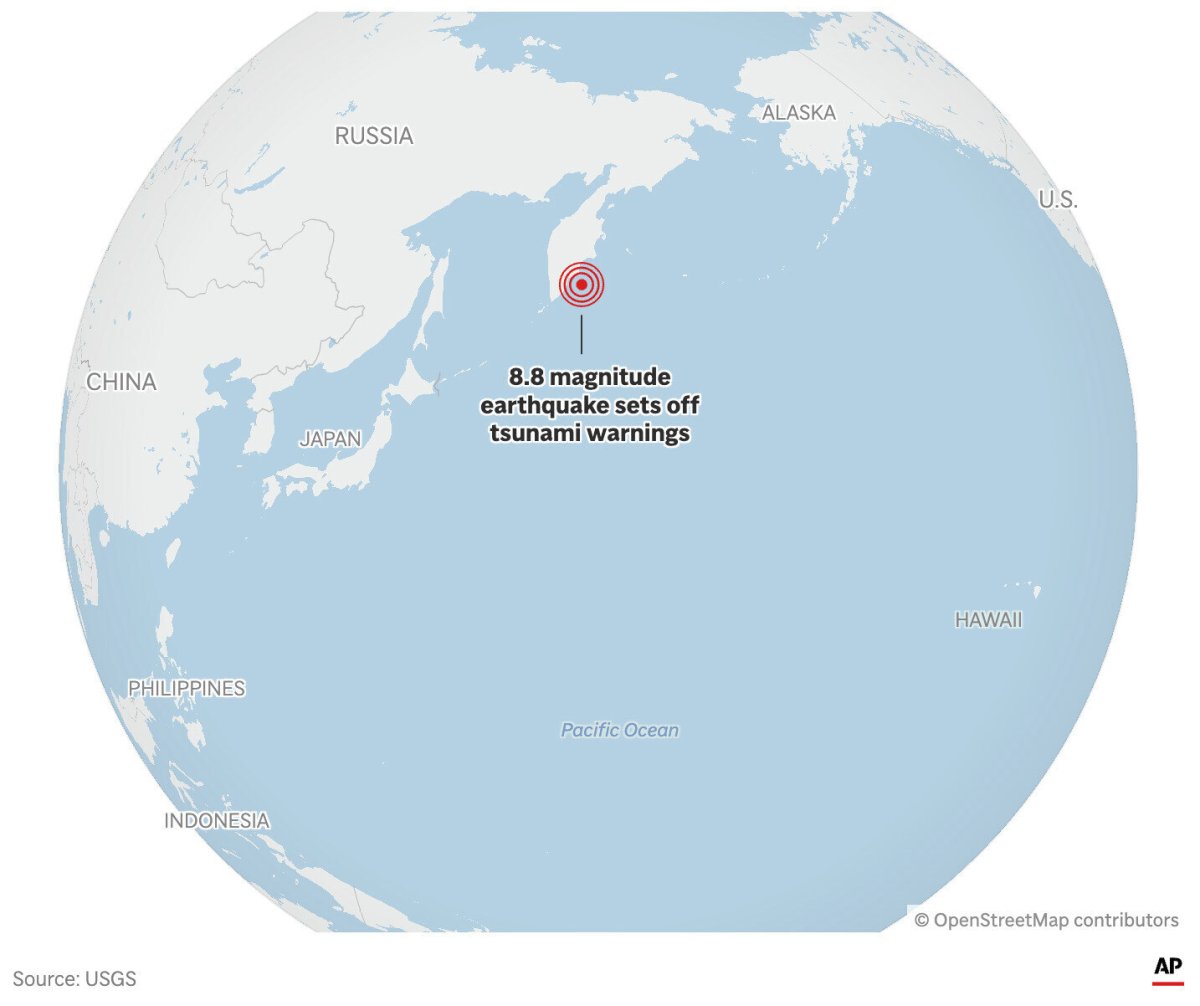
The map above locates the epicenter of an 8.8 magnitude earthquake in Russia that has triggered tsunami warnings across the Pacific Ocean.
The map above locates the epicenter of an 8.8 magnitude earthquake in Russia that has triggered tsunami warnings across the Pacific Ocean.
AP Graphic
The epicenter lay roughly 74 miles southeast of Petropavlovsk-Kamchatsky, a city of 180,000 on the rugged Kamchatka Peninsula.
Waves from the initial tsunami hit Severo-Kurilsk, the primary settlement on the Kuril Islands, according to regional Governor Valery Limarenko.
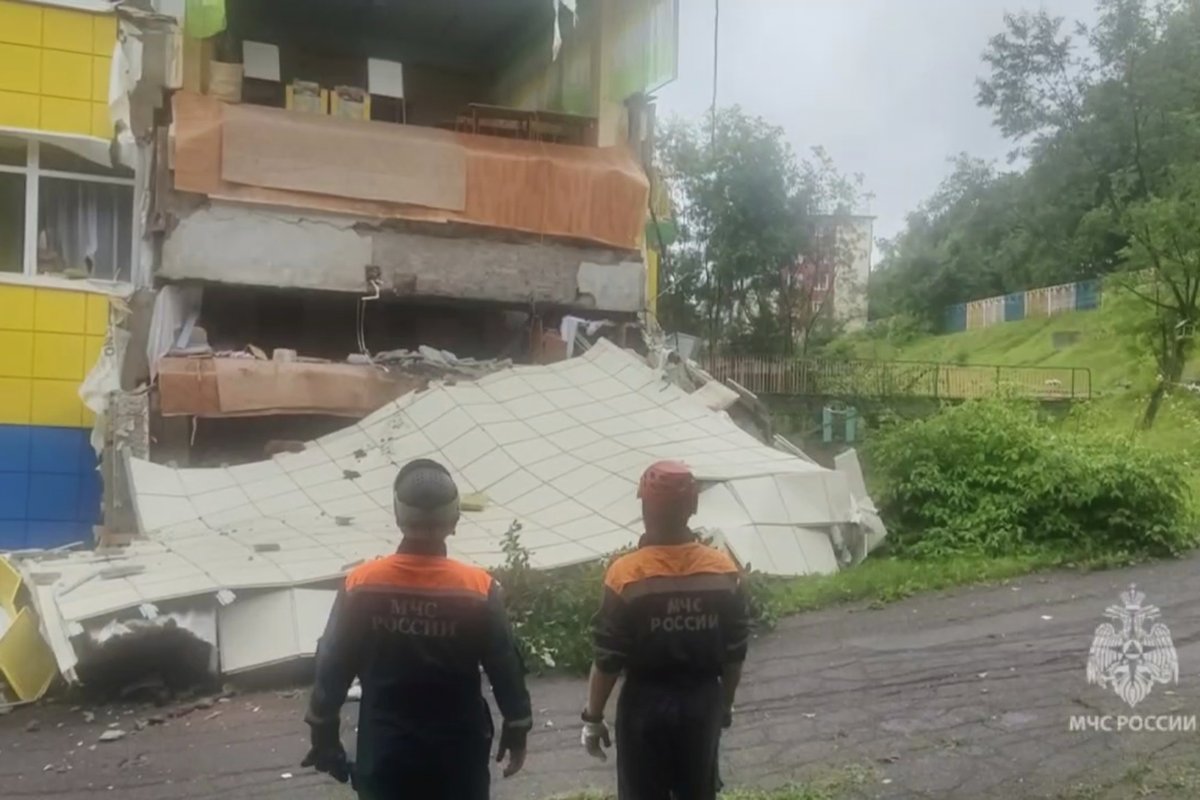
In this image taken from a video released by Russian Emergency Ministry Press Service, rescuers inspect a kindergarten damaged by an earthquake in Petropavlovsk-Kamchatsky, Russia, Wednesday, July 30, 2025.
In this image taken from a video released by Russian Emergency Ministry Press Service, rescuers inspect a kindergarten damaged by an earthquake in Petropavlovsk-Kamchatsky, Russia, Wednesday, July 30, 2025.
Russian Emergency Ministry Press Service via AP
Around 2,700 residents were safely evacuated to higher ground, with officials warning of possible follow-up surges. On the mainland, buildings swayed and some sustained structural damage in Petropavlovsk-Kamchatsky.
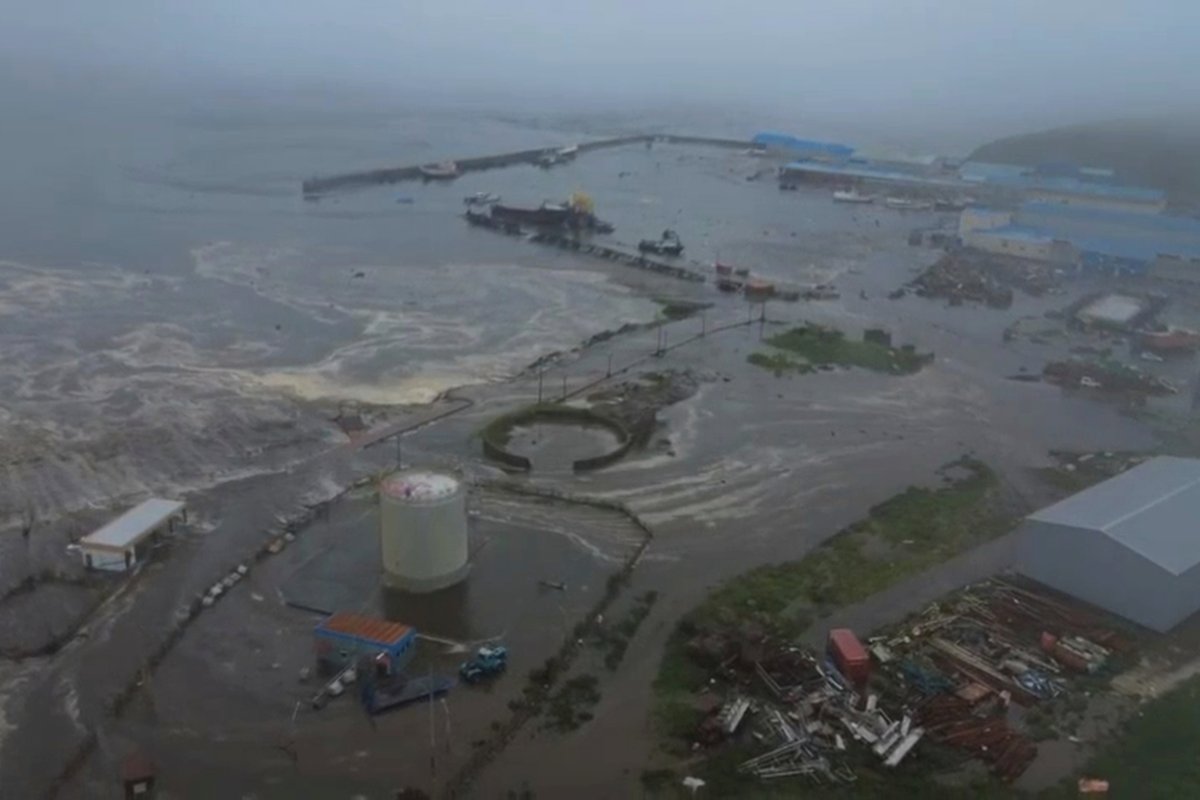
This image taken from a video released by Geophysical Service of the Russian Academy of Sciences, shows the aftermath of tsunami hitting the coastal area of Severo-Kurilsk at Paramushir island of Kuril Islands, Russia, Wednesday,…
This image taken from a video released by Geophysical Service of the Russian Academy of Sciences, shows the aftermath of tsunami hitting the coastal area of Severo-Kurilsk at Paramushir island of Kuril Islands, Russia, Wednesday, July 30, 2025.
More
Geophysical Service of the Russian Academy of Sciences via AP
The quake was followed by multiple strong aftershocks, including one registering 6.9 in magnitude, keeping the region on edge.
03:07 AM EDT
Pacific Warning Center Update
Chip McCreery of the Pacific Tsunami Warning Center, told a news briefing:
“We want to monitor this for quite a few wave cycles to make sure the pattern is really going down, and it’s not going to pop back up again.”
On damage, McCreery said:
“So far we haven’t seen anything too big but it’s still a little bit early.”
“We’re not out of the woods yet but I’m quite happy that, at least on our gauges, we haven’t seen numbers like 10 feet above normal sea level. The biggest ones are close to 10 feet, crest to trough.”
“We’ve seen quite a few cycles and there haven’t been any surprises. It did grow after the first wave but it hasn’t grown very quickly after that. In most places, maybe we’ve seen the worst of it.”
03:05 AM EDT
Map Shows US Areas Under Tsunami Threat
The National Oceanic and Atmospheric Administration’s Tsunami Warning Center (TWC) maps show Hawaii, parts of Alaska’s Aleutian Islands, and a portion of Northern California are currently under a rare tsunami warning—the highest level of alert—while the remainder of the U.S. West Coast is under a less severe tsunami advisory.
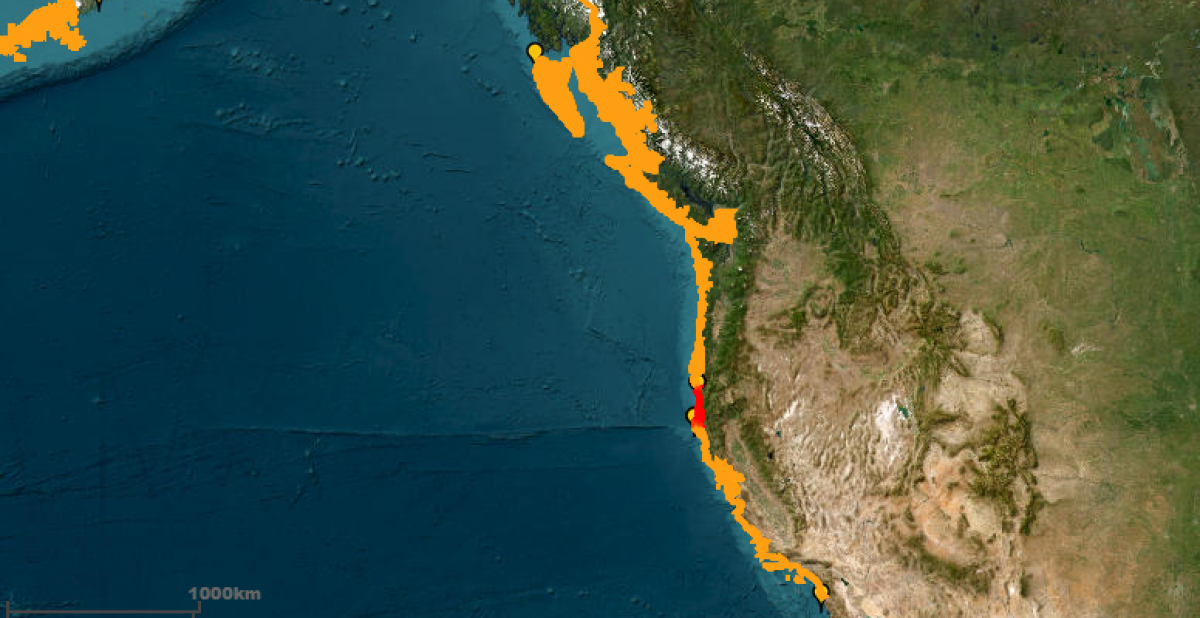
US West Coast tsunami warnings
US West Coast tsunami warnings
NOAA
In Oregon and Washington waves were expected to begin round 11:35p.m. PT. In California, waves were expected to arrive shortly after 11:50 p.m. PT, reaching San Francisco Bay around 12:40 a.m. PT and Los Angeles Harbor by 1:00 a.m. PT.
READ IN FULL: Tsunami Warning Map Shows US Areas Under Threat
02:58 AM EDT
Tsunami Impacts Could Last Hours
Dave Snider, tsunami warning coordinator with the National Tsunami Warning Center in Alaska, said the impacts could be felt for many hours:
“A tsunami is not just one wave. It’s a series of powerful waves over a long period of time. Tsunamis cross the ocean at hundreds of miles an hour — as fast as a jet airplane — in deep water. But when they get close to the shore, they slow down and start to pile up. And that’s where that inundation problem becomes a little bit more possible there.”
02:51 AM EDT
Hawaii Governor Josh Green: Black Hawk Helicopters Activated
Hawaii Governor Josh Green has given a briefing, stating large waves have already struck the islands and they are on alert for more:
“There’s multiple readings of the waves all across the Pacific and all across the islands. So there’s a printout that we see dozens of those measurements and they’ve ranged from 0.23 meters in some cases to over a meter. So we have had a couple of waves of that size. The largest wave we believe we saw was in Haleiwa, well over a meter,” he said, referring to a Hawaii beach.
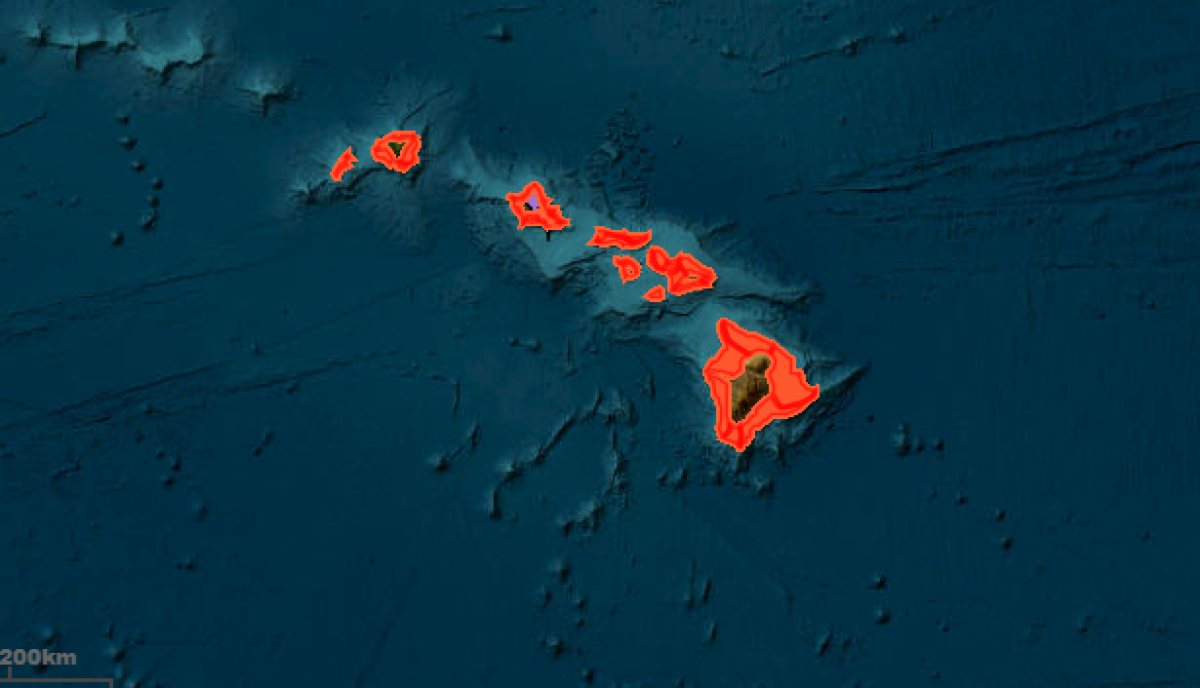
Hawaii tsunami alerts in place.
Hawaii tsunami alerts in place.
NOAA
“Of course, the pause that we had was also watching the shoreline recede when we saw the water pull back 20 or 30 feet. That seemed like an anticipated large wave, that’s what we’ve all seen historically.”
“We’re really hoping that we are soon out of harm’s way. We don’t want anyone to let their guard down. We want it to go another couple of hours. As the waves cycle smaller and smaller, that’s how we know that we’re ending this concern.”
He said Black Hawk helicopters have been activated and high-water vehicles were ready to go in case authorities need to rescue people.
A Hawaii television network broadcast pictures of a flooded beach-side parking lot at Coconut Island, in Hilo.
02:45 AM EDT
Tsunami Sirens in Northern California as Warning Issued
Tsunami sirens sounded late Tuesday night in Crescent City, a remote coastal community in Northern California, as officials warned residents to steer clear of beaches and waterways following a Pacific-wide alert.
“You are hearing a Tsunami Siren. We are under a Tsunami Warning. Please stay away from beaches and waterways. A predicted wave may hit at 11:55 pm. We are waiting on additional information about any level of evacuation,” read a post from the City Hall Facebook account.
The town of 6,000, nestled near the Oregon border, is no stranger to tsunami devastation—in 1964, a deadly 21-foot wave triggered by an Alaskan earthquake killed 11 people and flattened much of its downtown. Local authorities continue to monitor the threat as new information emerges.
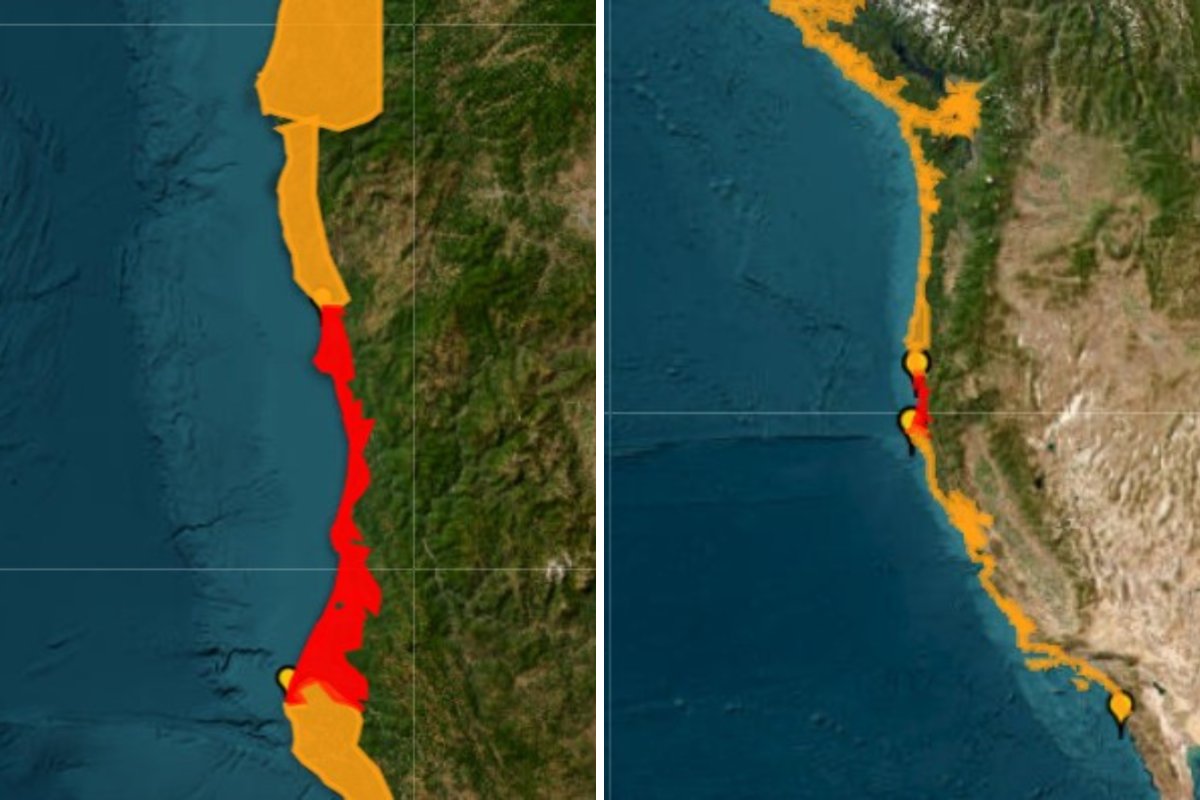
The coastline of California under tsunami warning.
The coastline of California under tsunami warning.
NOAA
02:40 AM EDT
Japan Issues Evacuation Advisories for Nearly 2 Million Amid Tsunami Threat
On Japan’s eastern seaboard, nearly 2 million residents in over 220 coastal municipalities have been placed under evacuation advisories, the Fire and Disaster Management Agency has announced.
The sweeping alerts come in response to waves generated by a powerful offshore earthquake near Russia’s Far East.
Authorities continue to urge coastal communities to remain on high alert.
02:38 AM EDT
Tsunami Alert: Live Wind Waves Tracker Map
This interactive map from Windy.com slow live wind waves tracker for the region where tsunami alerts are in place:

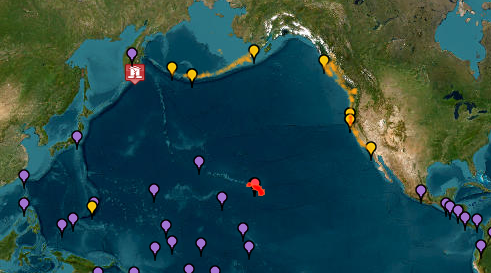
AloJapan.com